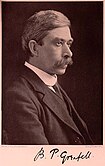Papyrus 9
| New Testament manuscript | |
 1 John 4:11-12,14-17 | |
| Name | P. Oxy. 402 |
|---|---|
| Text | 1 John 4 † |
| Date | 3rd century |
| Script | Greek |
| Found | Oxyrhynchus, Egypt |
| Now at | Houghton Library |
| Cite | Grenfell & A. S. Hunt, Oxyrhynchus Papyri III (1903), pp. 2-3 |
| Size | 8 x 5.2 c, [11 x 15] |
| Type | Alexandrian text-type |
| Category | I |
| Hand | irregular |
Papyrus 9 (in the Gregory-Aland numbering), signed by 𝔓9, and named Oxyrhynchus papyri 402, is an early copy of the New Testament in Greek. It is a papyrus manuscript of the First Epistle of John, dating paleographically to the early 3rd century.[1]
Description
[edit]Papyrus 𝔓9 was discovered by Bernard Pyne Grenfell and Arthur Surridge Hunt in Oxyrhynchus, Egypt. Papyrus 𝔓9 is currently housed at the Houghton Library, Harvard University, Semitic Museum Inv. 3736, Cambridge (Massachusetts).[1][2]
The surviving text is a fragment of one leaf containing verses 4:11-12,14-17, written in one column per page. The original codex had 16 lines per page. The text on the manuscript was written very carelessly, evidenced by the crude and irregular handwriting, and the manuscript contains some unintelligible spellings.[1]
Text
[edit]The Greek text of this codex is representative of the Alexandrian text-type. Aland placed it in Category I.[3] The manuscript is too brief for certainty.
See also
[edit]- 1 John 4
- List of New Testament papyri
- Oxyrhynchus papyri
- Papyrus 10
- Papyrus Oxyrhynchus 401
- Papyrus Oxyrhynchus 403
References
[edit]- ^ a b c Comfort, Philip W.; David P. Barrett (2001). The Text of the Earliest New Testament Greek Manuscripts. Wheaton, Illinois: Tyndale House Publishers. p. 79. ISBN 978-0-8423-5265-9.
- ^ "Handschriftenliste". Münster: Institute for New Testament Textual Research. Retrieved 23 August 2011.
- ^ Aland, Kurt; Aland, Barbara (1995). The Text of the New Testament: An Introduction to the Critical Editions and to the Theory and Practice of Modern Textual Criticism. Erroll F. Rhodes (trans.). Grand Rapids: William B. Eerdmans Publishing Company. p. 96. ISBN 978-0-8028-4098-1.
Further reading
[edit]- B. P., Grenfell; Hunt, A. S. (1898). Oxyrhynchus Papyri III. London. pp. 2–3.
{{cite book}}: CS1 maint: location missing publisher (link) - Gregory, Caspar René (1908). Die griechischen Handschriften des Neuen Testament. Leipzig: J.C. Hinrichs’sche Buchhandlung. p. 46.


 French
French Deutsch
Deutsch


